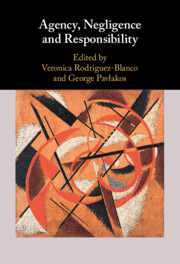Book contents
- Agency, Negligence and Responsibility
- Agency, Negligence and Responsibility
- Copyright page
- Dedication
- Contents
- Figures
- Contributors
- Acknowledgements
- Introduction
- Part I Will and Blameworthiness
- Part II Agency, Reasons and Inadvertence
- Chapter 5 The Possibility of Pure Negligence
- Chapter 6 Agent-Relativity without Control
- Chapter 7 The Boundaries of Negligence
- Chapter 8 The Backward-Looking Puzzle of Responsibility in Negligence
- Chapter 9 Responsibility and Agency
- Part III The Significance of Action in Negligence
- Bibliography
- Index
Chapter 6 - Agent-Relativity without Control
Grounding Negligence on Normative Relations
from Part II - Agency, Reasons and Inadvertence
Published online by Cambridge University Press: 28 October 2021
- Agency, Negligence and Responsibility
- Agency, Negligence and Responsibility
- Copyright page
- Dedication
- Contents
- Figures
- Contributors
- Acknowledgements
- Introduction
- Part I Will and Blameworthiness
- Part II Agency, Reasons and Inadvertence
- Chapter 5 The Possibility of Pure Negligence
- Chapter 6 Agent-Relativity without Control
- Chapter 7 The Boundaries of Negligence
- Chapter 8 The Backward-Looking Puzzle of Responsibility in Negligence
- Chapter 9 Responsibility and Agency
- Part III The Significance of Action in Negligence
- Bibliography
- Index
Summary
I shall, first, adumbrate the sceptical challenge that arises from those views which argue that inadvertent action involves voluntariness in some deep sense of the concept. In a second step, I will suggest that we should not regard inadvertence as a block to a unified picture of moral responsibility. For, responsibility does not require voluntariness in a wholesale manner. Then I will draw on the theory and practice of the law of torts to suggest the plausibility of the distinction between responsibility and standards of fault. Subsequently, I trace a more principled foundation for this distinction in the philosophical literature: Tim Scanlon, drawing on the distinction between blame and permissibility, has demonstrated convincingly that the mental states of agents, which are relevant for determining blame, should not (in principle) feature among the grounds of the permissibility of actions. The argument submits that permissibility is determined by (objective) reasons for action while blame depends on the meaning of actions, which requires reference to (subjective) mental states of agents. I conclude by siding with authors who argue that among the grounds of responsibility is a reason not to act negligently. Notably, this displacement of negligence from voluntariness to the realm of reasons suggests that responsibility entails capacity for rational agency.
Keywords
- Type
- Chapter
- Information
- Agency, Negligence and Responsibility , pp. 118 - 135Publisher: Cambridge University PressPrint publication year: 2021



